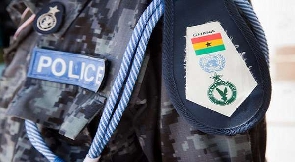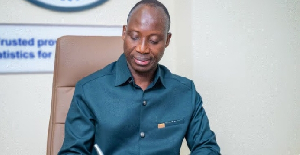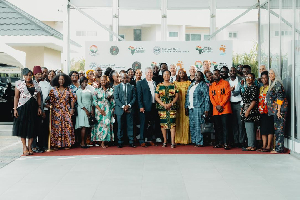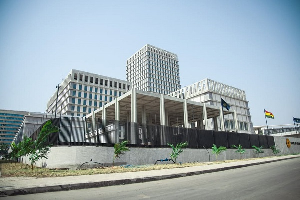By Kwame Okoampa-Ahoofe, Jr., Ph.D.
Garden City, New York
August 30, 2014
E-mail: okoampaahoofe@optimum.net
I don't know how this fit of rowdy propaganda-projects agenda began with the leadership of the National Democratic Congress (NDC). Very likely it has everything to do with the party leadership's morbid obsession with hanging onto power in perpetuity. Rawlings put the sugary taste of raw power on their tongues; it tasted as divinely sweet as nothing they had ever tasted before; and these rascals have since decided that it would either be them ravenously sucking and nibbling at the honeyey breasts of Mother Ghana or nobody else.
What is most worrisome and tragically clear about such ballot-box-oriented projects, though, is that their aims and objectives do not seem to be coherently connected to sustainable, or long-term, development. Since he "mysteriously" passed on some two years ago, I have yet to hear, read or see any credible progress report on the proposed state-of-the-art, or rather the-science, universities initiated by President John Evans Atta-Mills in the Volta and the Brong-Ahafo regions. I also recall the latter's former arch-lieutenant and successor presently, President John Dramani Mahama, add another tertiary project to the already unwieldy ones in the form of an Eastern Regional University, to be located on the Krobo Hills.
But what is rather curious here is that all this fit of propaganda projects comes on the heels of the woeful inability of the government to meet its financial and other capital-resource obligations to the staff of such relatively well-established tertiary academies as the University of Ghana, Cape Coast, Education, Mines and Science and Technology (KNUST). Even as I write, the University Teachers' Association of Ghana, as well as the Polytechnic Teachers' Association of Ghana (POTAG), is on strike over such professionally basic and embarrassingly pedestrian matter as the long and mutually-negotiated Book and Research Allowance (BRA) stipends. And so just exactly is the Mahama-led National Democratic Congress government up to?
And this is why I unreservedly agree with the dynamic, healthily outspoken and progressive founding-director of the IMANI-Ghana think-tank, Mr. Franklin Cudjoe, that the decision by the government to re-establish a national airline, while unquestionably laudable, nevertheless, is woefully inopportune at this time, if also because it is managerially wrong-headed (See "New Airline Would Fail - IMANI Boss Warns" Starrfmonline.com / Ghanaweb.com 8/30/14). It is administratively wrong-headed, evidently, because since the collapse of the nation's first airline, Ghana Airways, at least two attempts to revive the same have proven fiasco.
It is also rather amazing why Mr. Mahama and his minions have not availed themselves of the intricate dynamics of how successful national airlines are run by the most successful nations around the globe. I mean, a far better reason than sheer national pride ought to be the motivating factor for either the revival of the long-defunct Ghana Airways, or the re-establishment of a similar venture. For starters, the government needs to go back and spend ample time studying the causative factors underlying the collapse of Ghana Airways and the two other failed resuscitation attempts.
In other words, we are talking about economic viability and managerial competence, not such residual intangibles as pride and prestige. After all, what is the long-term value of pride and prestige if, in the long haul, the overburdened Ghanaian taxpayer gets further saddled with the humongous cost of another such epic failure? For those of our readers too young to remember, this was exactly the bone of contention between prestige-tanked President Nkrumah and the Danquah-Dombo-Busia-led pragmatists of the main opposition United Party during the late 1950s and early 1960s.
As a people, our leadership has to be guided by such critical and progressive concepts as value-for-money, economic viability, efficiency, quality-of-life improvement, environmental enhancement, comfort and ease; and then we may be able to afford the patent luxuries that are pride and prestige. Indeed, when the Minister of Transport, Ms. Dzifa Attivor, brought up the issue before the Ghanaian public about a year, or so, ago, I vividly remember highlighting the fact that the mathematics of the aforesaid venture rang jarringly of the epically impossible. I don't, however, vividly recall the quiddities of the proposed revival of Ghana Airways as Ms. Attivor presented it, but it surely sounded like a "Monkey-Work-Baboon-Chop" venture, in which an external party was supposed to foot the humongous bill for most of the expenditure involved in the operation of such a national airline, while the government undeservingly reaped a sizeable percentage of the profits accruing therefrom.
It just didn't stand to reason then, and I am not quite certain that much has changed since then. It just didn't make sense; or maybe characteristically, this front-burner NDC operative was just pulling wool over the eyes of a concerned, vigilant and discerning Ghanaian public. Indeed, anytime that a subject of this nature comes up for discussion, I am reminded of the evergreen admonishment proffered by the world-renowned Kenyan political scientist and historian, Prof. Ali A. Mazrui, that the single greatest impediment to the meaningful, and remarkable, development of postcolonial Africa is the abject lack of the salutary culture of maintenance.
We simply cannot keep adding more and more projects to our already brimfull plate of poorly maintained facilities and abandoned half-started and half-completed projects. In other words, meaningful development simply does not work this way. By the way, whatever happened to the Kotokuraba Market Project in Cape Coast, Mr. President?
______________________________________________________________
Opinions of Sunday, 7 September 2014
Columnist: Okoampa-Ahoofe, Kwame














